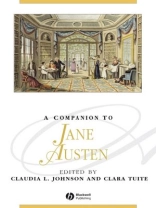Reflecting the dynamic and expansive nature of Austen studies, A Companion to Jane Austen provides 42 essays from a distinguished team of literary scholars that examine the full breadth of the English novelist’s works and career.
- Provides the most comprehensive and up-to-date array of Austen scholarship
- Functions both as a scholarly reference and as a survey of the most innovative speculative developments in the field of Austen studies
- Engages at length with changing contexts and cultures of reception from the nineteenth to the twenty-first centuries
Содержание
List of Figures ix
Notes on Contributors x
List of Abbreviations xvii
A Note to the Reader xviii
Acknowledgments xix
Introduction 1
Claudia L. Johnson and Clara Tuite
Part I The Life and the Texts 11
1 Jane Austen’s Life and Letters 13
Kathryn Sutherland
2 The Austen Family Writing: Gossip, Parody, and Corporate Personality 31
Robert L. Mack
3 The Literary Marketplace 41
Jan Fergus
4 Texts and Editions 51
Brian Southam
5 Jane Austen, Illustrated 62
Laura Carroll and John Wiltshire
Part II Reading the Texts 79
6 Young Jane Austen: Author 81
Juliet Mc Master
7 Moving In and Out: The Property of Self in Sense and Sensibility 91
Susan C. Greenfi eld
8 The Illusionist: Northanger Abbey and Austen’s Uses of Enchantment 101
Sonia Hofkosh
9 Re: Reading Pride and Prejudice: ‘What think you of books?’ 112
Susan J. Wolfson
10 The Missed Opportunities of Mansfi eld Park 123
William Galperin
11 Emma: Word Games and Secret Histories 133
Linda Bree
12 Persuasion: The Gradual Dawning 143
Fiona Stafford
13 Sanditon and the Book 153
George Justice
Part III Literary Genres and Genealogies 163
14 Turns of Speech and Figures of Mind 165
Margaret Anne Doody
15 Narrative Technique: Austen and Her Contemporaries 185
Jane Spencer
16 Time and Her Aunt 195
Michael Wood
17 Austen’s Realist Play 206
Harry E. Shaw
18 Dealing in Notions and Facts: Jane Austen and History Writing 216
Devoney Looser
19 Sentiment and Sensibility: Austen, Feeling, and Print Culture 226
Miranda Burgess
20 The Gothic Austen 237
Nancy Armstrong
Part IV Political, Social, and Cultural Worlds 249
21 From Politics to Silence: Jane Austen’s Nonreferential Aesthetic 251
Mary Poovey
22 The Army, the Navy, and the Napoleonic Wars 261
Gillian Russell
23 Jane Austen, the 1790s, and the French Revolution 272
Mary Spongberg
24 Feminisms 282
Vivien Jones
25 Imagining Sameness and Difference: Domestic and Colonial Sisters in Mansfield Park 292
Deirdre Coleman
26 Jane Austen and the Nation 304
Claire Lamont
27 Religion 314
Roger E. Moore
28 Family Matters 323
Ruth Perry
29 Austen and Masculinity 332
E. J. Clery
30 The Trouble with Things: Objects and the Commodifi cation of Sociability 343
Barbara M. Benedict
31 Luxury: Making Sense of Excess in Austen’s Narratives 355
Diego Saglia
32 Austen’s Accomplishment: Music and the Modern Heroine 366
Gillen D’Arcy Wood
33 Jane Austen and Performance: Theatre, Memory, and Enculturation 377
Daniel O’Quinn
Part V Reception and Reinvention 389
34 Jane Austen and Genius 391
Deidre Lynch
35 Jane Austen’s Periods 402
Mary A. Favret
36 Nostalgia 413
Nicholas Dames
37 Austen’s European Reception 422
Anthony Mandal
38 Jane Austen and the Silver Fork Novel 434
Edward Copeland
39 Jane Austen in the World: New Women, Imperial Vistas 444
Katie Trumpener
40 Sexuality 456
Fiona Brideoake
41 Jane Austen and Popular Culture 467
Judy Simons
42 Austenian Subcultures 478
Mary Ann O’Farrell
Bibliography 488
Index 513
Об авторе
Claudia L. Johnson is Chair of the Department of English at Princeton University. Her previous books include Jane Austen: Women, Politics, and the Novel (1988), Equivocal Beings: Politics, Gender and Sentimentality in the 1790s (1995), and The Cambridge Companion to Mary Wollstonecraft (2002), along with editions of Jane Austen’s Mansfield Park (1998), Sense and Sensibility (2002), and Northanger Abbey (2003). Her forthcoming works include Jane Austen’s Cults and Cultures, tracing permutations of “Jane mania” from 1817 to the present, and Raising the Novel, which explores modern efforts to create a novelistic canon by elevating novels to keystones of high culture.
Clara Tuite is Senior Lecturer in English at the University of Melbourne. She is the author of Romantic Austen: Sexual Politics and the Literary Canon (2002, 2008), as well as several essays on Austen, and the co-editor, with Gillian Russell, of Romantic Sociability: Social Networks and Literary Culture in Britain, 1770-1840 (2002, 2006).












